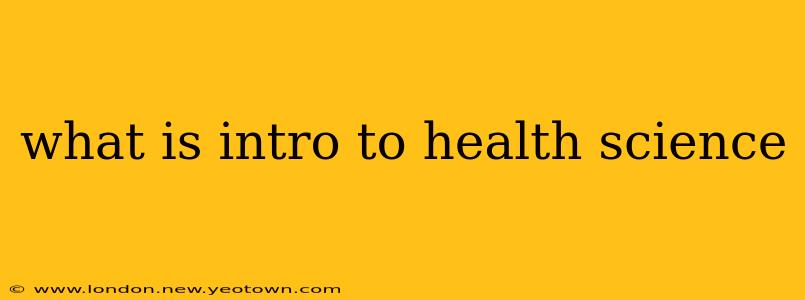What is an Introduction to Health Science? Unlocking the World of Healthcare
Imagine a world brimming with cutting-edge medical technology, groundbreaking research, and dedicated professionals striving to improve human health. That's the world of health science, and an introductory course provides your first glimpse into this fascinating and vital field. It's not just about doctors and nurses; it's a vast ecosystem of careers, all interconnected and working towards a common goal: better health outcomes for everyone.
This introductory course acts as a compass, guiding you through the diverse landscape of healthcare. It's like opening a door to a sprawling library, revealing countless books filled with knowledge about the human body, disease processes, healthcare systems, and the ethical considerations that shape this complex industry.
Instead of diving straight into specialized areas like cardiology or oncology, an "Intro to Health Science" course provides a foundational understanding. Think of it as building a strong base before constructing a skyscraper – you need the groundwork to support the complexity that follows.
What topics are typically covered in an Introduction to Health Science course?
This varies depending on the institution, but generally, you can expect to explore several key areas:
- Human Anatomy and Physiology: Understanding the structure and function of the human body is paramount. You'll learn about cells, tissues, organs, and systems, and how they interact to maintain health. This forms the bedrock upon which all other health sciences are built.
- Medical Terminology: Navigating the healthcare world requires understanding its language. You'll learn the prefixes, suffixes, and root words that make up medical terms, enabling you to comprehend medical charts, research papers, and conversations with healthcare professionals.
- Healthcare Systems: How does healthcare function on a larger scale? An introductory course will provide an overview of different healthcare systems worldwide, their strengths and weaknesses, and the challenges they face. This might include discussions about access to care, insurance, and the role of government regulation.
- Disease Processes: Understanding how diseases develop, progress, and affect the body is crucial. You'll learn about various disease categories, their causes, symptoms, and treatments, providing a broad understanding of common health issues.
- Healthcare Careers: This is where the course truly opens your eyes to the possibilities. You'll explore the vast array of careers within the healthcare field, from physicians and nurses to medical technicians, researchers, and administrators. This section helps students identify potential career paths that align with their interests and skills.
- Ethics in Healthcare: Healthcare involves making difficult decisions with ethical implications. This part of the course covers topics such as patient confidentiality, informed consent, and end-of-life care, highlighting the crucial role of ethical considerations in healthcare practice.
What are the benefits of taking an Introduction to Health Science course?
Beyond simply fulfilling academic requirements, an introductory health science course offers several significant benefits:
- Career Exploration: It helps you explore various career options within healthcare and determine if this field is the right fit for your interests and skills.
- Stronger Foundation: It lays a solid groundwork for future studies in health-related fields, whether you choose to pursue a nursing degree, medical school, or a career in public health.
- Improved Health Literacy: You'll gain a better understanding of your own health, enabling you to make informed decisions about your well-being.
- Enhanced Critical Thinking: Analyzing complex medical issues and ethical dilemmas will sharpen your critical thinking skills.
Is an Introduction to Health Science hard?
The difficulty depends on your background and learning style. While it requires dedicated effort and a willingness to learn new concepts, it's not necessarily more challenging than other introductory college courses. Many institutions offer support services such as tutoring and study groups to help students succeed.
What can I do with an Introduction to Health Science course?
An introductory course can be a stepping stone to a wide range of further education and career options, including:
- Pre-med programs: Many aspiring doctors use it as a foundational course.
- Nursing programs: It forms part of the curriculum for many nursing programs.
- Allied health professions: It provides a solid base for studying fields such as respiratory therapy, physical therapy, or medical technology.
- Public health: Those interested in public health initiatives and policy will find it beneficial.
- Healthcare administration: It lays the groundwork for management roles within healthcare systems.
In essence, an introduction to health science is more than just a course; it's a gateway to a rewarding and impactful career path in a field that constantly evolves and strives to improve the quality of life for individuals and communities worldwide. It's a journey of discovery, providing a foundational understanding that enables you to make a meaningful contribution to the world of healthcare.

